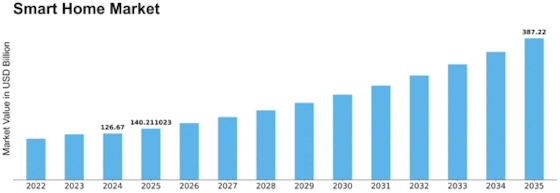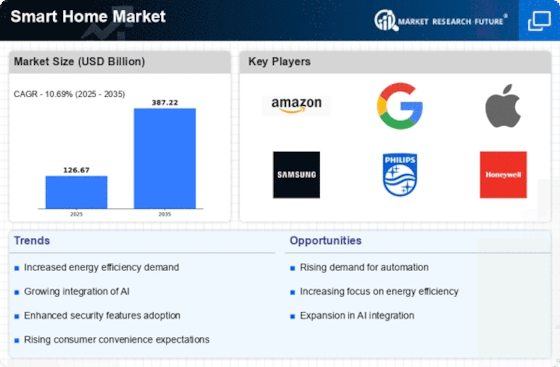Smart Lighting
Smart Security Systems
Smart Thermostats
Smart Home Appliances
Smart Entertainment Systems
Wi-Fi
Zigbee
Bluetooth
Thread
Z-Wave
Home Automation
Energy Management
Security Surveillance
Health Monitoring
Entertainment Control
Residential
Commercial
Industrial
North America
Europe
South America
Asia Pacific
Middle East and Africa
North America Outlook (USD Billion, 2019-2035)
North America Market by Product Type
Smart Lighting
Smart Security Systems
Smart Thermostats
Appliances
Smart Entertainment Systems
North America Market by Technology Type
Wi-Fi
Zigbee
Bluetooth
Thread
Z-Wave
North America Market by Application Type
Home Automation
Energy Management
Security Surveillance
Health Monitoring
Entertainment Control
North America Market by End Use Type
Residential
Commercial
Industrial
North America Market by Regional Type
US
Canada
US Outlook (USD Billion, 2019-2035)
US Market by Product Type
Smart Lighting
Smart Security Systems
Smart Thermostats
Appliances
Smart Entertainment Systems
US Market by Technology Type
Wi-Fi
Zigbee
Bluetooth
Thread
Z-Wave
US Market by Application Type
Home Automation
Energy Management
Security Surveillance
Health Monitoring
Entertainment Control
US Market by End Use Type
Residential
Commercial
Industrial
CANADA Outlook (USD Billion, 2019-2035)
CANADA Market by Product Type
Smart Lighting
Smart Security Systems
Smart Thermostats
Appliances
Smart Entertainment Systems
CANADA Market by Technology Type
Wi-Fi
Zigbee
Bluetooth
Thread
Z-Wave
CANADA Market by Application Type
Home Automation
Energy Management
Security Surveillance
Health Monitoring
Entertainment Control
CANADA Market by End Use Type
Residential
Commercial
Industrial
Europe Outlook (USD Billion, 2019-2035)
Europe Market by Product Type
Smart Lighting
Smart Security Systems
Smart Thermostats
Appliances
Smart Entertainment Systems
Europe Market by Technology Type
Wi-Fi
Zigbee
Bluetooth
Thread
Z-Wave
Europe Market by Application Type
Home Automation
Energy Management
Security Surveillance
Health Monitoring
Entertainment Control
Europe Market by End Use Type
Residential
Commercial
Industrial
Europe Market by Regional Type
Germany
UK
France
Russia
Italy
Spain
Rest of Europe
GERMANY Outlook (USD Billion, 2019-2035)
GERMANY Market by Product Type
Smart Lighting
Smart Security Systems
Smart Thermostats
Appliances
Smart Entertainment Systems
GERMANY Market by Technology Type
Wi-Fi
Zigbee
Bluetooth
Thread
Z-Wave
GERMANY Market by Application Type
Home Automation
Energy Management
Security Surveillance
Health Monitoring
Entertainment Control
GERMANY Market by End Use Type
Residential
Commercial
Industrial
UK Outlook (USD Billion, 2019-2035)
UK Market by Product Type
Smart Lighting
Smart Security Systems
Smart Thermostats
Appliances
Smart Entertainment Systems
UK Market by Technology Type
Wi-Fi
Zigbee
Bluetooth
Thread
Z-Wave
UK Market by Application Type
Home Automation
Energy Management
Security Surveillance
Health Monitoring
Entertainment Control
UK Market by End Use Type
Residential
Commercial
Industrial
FRANCE Outlook (USD Billion, 2019-2035)
FRANCE Market by Product Type
Smart Lighting
Smart Security Systems
Smart Thermostats
Appliances
Smart Entertainment Systems
FRANCE Market by Technology Type
Wi-Fi
Zigbee
Bluetooth
Thread
Z-Wave
FRANCE Market by Application Type
Home Automation
Energy Management
Security Surveillance
Health Monitoring
Entertainment Control
FRANCE Market by End Use Type
Residential
Commercial
Industrial
RUSSIA Outlook (USD Billion, 2019-2035)
RUSSIA Market by Product Type
Smart Lighting
Smart Security Systems
Smart Thermostats
Appliances
Smart Entertainment Systems
RUSSIA Market by Technology Type
Wi-Fi
Zigbee
Bluetooth
Thread
Z-Wave
RUSSIA Market by Application Type
Home Automation
Energy Management
Security Surveillance
Health Monitoring
Entertainment Control
RUSSIA Market by End Use Type
Residential
Commercial
Industrial
ITALY Outlook (USD Billion, 2019-2035)
ITALY Market by Product Type
Smart Lighting
Smart Security Systems
Smart Thermostats
Appliances
Smart Entertainment Systems
ITALY Market by Technology Type
Wi-Fi
Zigbee
Bluetooth
Thread
Z-Wave
ITALY Market by Application Type
Home Automation
Energy Management
Security Surveillance
Health Monitoring
Entertainment Control
ITALY Market by End Use Type
Residential
Commercial
Industrial
SPAIN Outlook (USD Billion, 2019-2035)
SPAIN Market by Product Type
Smart Lighting
Smart Security Systems
Smart Thermostats
Appliances
Smart Entertainment Systems
SPAIN Market by Technology Type
Wi-Fi
Zigbee
Bluetooth
Thread
Z-Wave
SPAIN Market by Application Type
Home Automation
Energy Management
Security Surveillance
Health Monitoring
Entertainment Control
SPAIN Market by End Use Type
Residential
Commercial
Industrial
REST OF EUROPE Outlook (USD Billion, 2019-2035)
REST OF EUROPE Market by Product Type
Smart Lighting
Smart Security Systems
Smart Thermostats
Appliances
Smart Entertainment Systems
REST OF EUROPE Market by Technology Type
Wi-Fi
Zigbee
Bluetooth
Thread
Z-Wave
REST OF EUROPE Market by Application Type
Home Automation
Energy Management
Security Surveillance
Health Monitoring
Entertainment Control
REST OF EUROPE Market by End Use Type
Residential
Commercial
Industrial
APAC Outlook (USD Billion, 2019-2035)
APAC Market by Product Type
Smart Lighting
Smart Security Systems
Smart Thermostats
Appliances
Smart Entertainment Systems
APAC Market by Technology Type
Wi-Fi
Zigbee
Bluetooth
Thread
Z-Wave
APAC Market by Application Type
Home Automation
Energy Management
Security Surveillance
Health Monitoring
Entertainment Control
APAC Market by End Use Type
Residential
Commercial
Industrial
APAC Market by Regional Type
China
India
Japan
South Korea
Malaysia
Thailand
Indonesia
Rest of APAC
CHINA Outlook (USD Billion, 2019-2035)
CHINA Market by Product Type
Smart Lighting
Smart Security Systems
Smart Thermostats
Appliances
Smart Entertainment Systems
CHINA Market by Technology Type
Wi-Fi
Zigbee
Bluetooth
Thread
Z-Wave
CHINA Market by Application Type
Home Automation
Energy Management
Security Surveillance
Health Monitoring
Entertainment Control
CHINA Market by End Use Type
Residential
Commercial
Industrial
INDIA Outlook (USD Billion, 2019-2035)
INDIA Market by Product Type
Smart Lighting
Smart Security Systems
Smart Thermostats
Appliances
Smart Entertainment Systems
INDIA Market by Technology Type
Wi-Fi
Zigbee
Bluetooth
Thread
Z-Wave
INDIA Market by Application Type
Home Automation
Energy Management
Security Surveillance
Health Monitoring
Entertainment Control
INDIA Market by End Use Type
Residential
Commercial
Industrial
JAPAN Outlook (USD Billion, 2019-2035)
JAPAN Market by Product Type
Smart Lighting
Smart Security Systems
Smart Thermostats
Appliances
Smart Entertainment Systems
JAPAN Market by Technology Type
Wi-Fi
Zigbee
Bluetooth
Thread
Z-Wave
JAPAN Market by Application Type
Home Automation
Energy Management
Security Surveillance
Health Monitoring
Entertainment Control
JAPAN Market by End Use Type
Residential
Commercial
Industrial
SOUTH KOREA Outlook (USD Billion, 2019-2035)
SOUTH KOREA Market by Product Type
Smart Lighting
Smart Security Systems
Smart Thermostats
Appliances
Smart Entertainment Systems
SOUTH KOREA Market by Technology Type
Wi-Fi
Zigbee
Bluetooth
Thread
Z-Wave
SOUTH KOREA Market by Application Type
Home Automation
Energy Management
Security Surveillance
Health Monitoring
Entertainment Control
SOUTH KOREA Market by End Use Type
Residential
Commercial
Industrial
MALAYSIA Outlook (USD Billion, 2019-2035)
MALAYSIA Market by Product Type
Smart Lighting
Smart Security Systems
Smart Thermostats
Appliances
Smart Entertainment Systems
MALAYSIA Market by Technology Type
Wi-Fi
Zigbee
Bluetooth
Thread
Z-Wave
MALAYSIA Market by Application Type
Home Automation
Energy Management
Security Surveillance
Health Monitoring
Entertainment Control
MALAYSIA Market by End Use Type
Residential
Commercial
Industrial
THAILAND Outlook (USD Billion, 2019-2035)
THAILAND Market by Product Type
Smart Lighting
Smart Security Systems
Smart Thermostats
Appliances
Smart Entertainment Systems
THAILAND Market by Technology Type
Wi-Fi
Zigbee
Bluetooth
Thread
Z-Wave
THAILAND Market by Application Type
Home Automation
Energy Management
Security Surveillance
Health Monitoring
Entertainment Control
THAILAND Market by End Use Type
Residential
Commercial
Industrial
INDONESIA Outlook (USD Billion, 2019-2035)
INDONESIA Market by Product Type
Smart Lighting
Smart Security Systems
Smart Thermostats
Appliances
Smart Entertainment Systems
INDONESIA Market by Technology Type
Wi-Fi
Zigbee
Bluetooth
Thread
Z-Wave
INDONESIA Market by Application Type
Home Automation
Energy Management
Security Surveillance
Health Monitoring
Entertainment Control
INDONESIA Market by End Use Type
Residential
Commercial
Industrial
REST OF APAC Outlook (USD Billion, 2019-2035)
REST OF APAC Market by Product Type
Smart Lighting
Smart Security Systems
Smart Thermostats
Appliances
Smart Entertainment Systems
REST OF APAC Market by Technology Type
Wi-Fi
Zigbee
Bluetooth
Thread
Z-Wave
REST OF APAC Market by Application Type
Home Automation
Energy Management
Security Surveillance
Health Monitoring
Entertainment Control
REST OF APAC Market by End Use Type
Residential
Commercial
Industrial
South America Outlook (USD Billion, 2019-2035)
South America Market by Product Type
Smart Lighting
Smart Security Systems
Smart Thermostats
Appliances
Smart Entertainment Systems
South America Market by Technology Type
Wi-Fi
Zigbee
Bluetooth
Thread
Z-Wave
South America Market by Application Type
Home Automation
Energy Management
Security Surveillance
Health Monitoring
Entertainment Control
South America Market by End Use Type
Residential
Commercial
Industrial
South America Market by Regional Type
Brazil
Mexico
Argentina
Rest of South America
BRAZIL Outlook (USD Billion, 2019-2035)
BRAZIL Market by Product Type
Smart Lighting
Smart Security Systems
Smart Thermostats
Appliances
Smart Entertainment Systems
BRAZIL Market by Technology Type
Wi-Fi
Zigbee
Bluetooth
Thread
Z-Wave
BRAZIL Market by Application Type
Home Automation
Energy Management
Security Surveillance
Health Monitoring
Entertainment Control
BRAZIL Market by End Use Type
Residential
Commercial
Industrial
MEXICO Outlook (USD Billion, 2019-2035)
MEXICO Market by Product Type
Smart Lighting
Smart Security Systems
Smart Thermostats
Appliances
Smart Entertainment Systems
MEXICO Market by Technology Type
Wi-Fi
Zigbee
Bluetooth
Thread
Z-Wave
MEXICO Market by Application Type
Home Automation
Energy Management
Security Surveillance
Health Monitoring
Entertainment Control
MEXICO Market by End Use Type
Residential
Commercial
Industrial
ARGENTINA Outlook (USD Billion, 2019-2035)
ARGENTINA Market by Product Type
Smart Lighting
Smart Security Systems
Smart Thermostats
Appliances
Smart Entertainment Systems
ARGENTINA Market by Technology Type
Wi-Fi
Zigbee
Bluetooth
Thread
Z-Wave
ARGENTINA Market by Application Type
Home Automation
Energy Management
Security Surveillance
Health Monitoring
Entertainment Control
ARGENTINA Market by End Use Type
Residential
Commercial
Industrial
REST OF SOUTH AMERICA Outlook (USD Billion, 2019-2035)
REST OF SOUTH AMERICA Market by Product Type
Smart Lighting
Smart Security Systems
Smart Thermostats
Appliances
Smart Entertainment Systems
REST OF SOUTH AMERICA Market by Technology Type
Wi-Fi
Zigbee
Bluetooth
Thread
Z-Wave
REST OF SOUTH AMERICA Market by Application Type
Home Automation
Energy Management
Security Surveillance
Health Monitoring
Entertainment Control
REST OF SOUTH AMERICA Market by End Use Type
Residential
Commercial
Industrial
MEA Outlook (USD Billion, 2019-2035)
MEA Market by Product Type
Smart Lighting
Smart Security Systems
Smart Thermostats
Appliances
Smart Entertainment Systems
MEA Market by Technology Type
Wi-Fi
Zigbee
Bluetooth
Thread
Z-Wave
MEA Market by Application Type
Home Automation
Energy Management
Security Surveillance
Health Monitoring
Entertainment Control
MEA Market by End Use Type
Residential
Commercial
Industrial
MEA Market by Regional Type
GCC Countries
South Africa
Rest of MEA
GCC COUNTRIES Outlook (USD Billion, 2019-2035)
GCC COUNTRIES Market by Product Type
Smart Lighting
Smart Security Systems
Smart Thermostats
Appliances
Smart Entertainment Systems
GCC COUNTRIES Market by Technology Type
Wi-Fi
Zigbee
Bluetooth
Thread
Z-Wave
GCC COUNTRIES Market by Application Type
Home Automation
Energy Management
Security Surveillance
Health Monitoring
Entertainment Control
GCC COUNTRIES Market by End Use Type
Residential
Commercial
Industrial
SOUTH AFRICA Outlook (USD Billion, 2019-2035)
SOUTH AFRICA Market by Product Type
Smart Lighting
Smart Security Systems
Smart Thermostats
Appliances
Smart Entertainment Systems
SOUTH AFRICA Market by Technology Type
Wi-Fi
Zigbee
Bluetooth
Thread
Z-Wave
SOUTH AFRICA Market by Application Type
Home Automation
Energy Management
Security Surveillance
Health Monitoring
Entertainment Control
SOUTH AFRICA Market by End Use Type
Residential
Commercial
Industrial
REST OF MEA Outlook (USD Billion, 2019-2035)
REST OF MEA Market by Product Type
Smart Lighting
Smart Security Systems
Smart Thermostats
Appliances
Smart Entertainment Systems
REST OF MEA Market by Technology Type
Wi-Fi
Zigbee
Bluetooth
Thread
Z-Wave
REST OF MEA Market by Application Type
Home Automation
Energy Management
Security Surveillance
Health Monitoring
Entertainment Control
REST OF MEA Market by End Use Type
Residential
Commercial
Industrial



















Leave a Comment